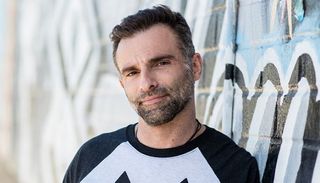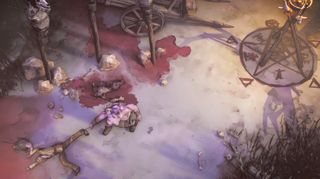Former Arkane boss on why he left triple-A: 'You're not making a game anymore, you're making a product'
Arkane founder Raphael Colantonio talks Weird West, immersive sims, and why he doesn't want to go back to big budgets.

The past two decades have been good to Raphael Colantonio. He founded Arkane in 1999, led it through Arx Fatalis and Dark Messiah of Might and Magic, and then hit the big time in 2012 with Dishonored and its multiple expansions and sequels. But after the release of Prey in 2017, he packed it all in, saying he wanted to step back from the industry and "reflect on what is important" to him and his future.
Now he's back, with a new operation, WolfEye Studios, and a new game, the isometric action-RPG Weird West. It's a departure from Colantonio's previous work at Arkane, all of it first-person RPGs and immersive sims like Dishonored and Prey, and as a big fan of that work (I still yell at people to play Arx and Dark Messiah whenever the opportunity comes up), I was curious why he’s gone in such a different direction for his first post-Arkane project. But he doesn’t see it that way.
"I don't feel it's so different, personally. It's more open, and the difference in perspective makes it so that it's a little more of a backseat view, rather than being through the player. But the values are actually pretty similar at the end of the day," Colantonio told me during a recent late-night phone call from inside his car, which he assured me was safely parked. (He apparently has a very busy schedule.)
"Usually I do games that are pretty confined, in an enclosed environment, where it's all about exploring a hostile environment, whether it's in Arx or Prey. Dishonored was a little bit different because it was mission to mission, but still, it was not like an open world. This time we're doing an open world thing, but the values are very similar to immersive sims the way we've always done them."
Moment-to-moment gameplay in Weird West will be action-oriented, akin to "an action-resolved version of something like Fallout meets Ultima 7," but the systems and simulations underlying it all are intended to provide a depth to the experience that might not be immediately apparent—"a space of possibilities where no two players have the same playthrough exactly," he said.
The bird's-eye view that players will have in Weird West may also camouflage its immersive sim ambitions somewhat, as they're more commonly first-person games. But Colantonio said that to him the experience doesn’t arise from perspective, but from having "hard rules" and not cheating players.
"If there's something that you see, it has a weight, it has physics properties ... It maps to some expectations of players of a system that is going to say 'yes' to them all the time," he said. "We don't fake things."
The biggest gaming news, reviews and hardware deals
Keep up to date with the most important stories and the best deals, as picked by the PC Gamer team.
In fact, Colantonio believes that genre has no bearing on the matter at all: Any game can be—and in his ideal world, all games would be—immersive sims, with choices and consequences that branch off into sometimes unexpected directions. But he also knows that not everyone feels the same way.
"I think a lot of people are fine with—happy, actually, maybe they feel safer—playing in games that are more channeled, that are more in a canyon, a very controlled experience, very prescribed," he said. "And then there's a cinematic that tells them a bit of story and they feel good about it, and then it keeps going and they kill a few more monsters, and then it stops again with another cinematic. I don't get that, it's not my thing. But technically, what we call immersive sims could be applied to anything, really."
I wondered if that deep-simulation approach to Weird West risks putting off those players expecting more of a run-and-gun experience—people, say, looking for a Diablo type of game who end up eyeballs-deep in Divinity: Original Sin instead. Colantonio acknowledged that it could happen, but said that it's a question he's grappled with through much of his career.
"I look at it the same way as back when I was at Arkane, I did games like Dishonored for example, and it was the same question," he said. "Is it too complicated? Are people going to be turned off by all the stealth and the indirect ways you can do things? I think as long as you bring up the accessibility, as long as you bring that depth to the surface, and it doesn't look complex—the problem is complexity—but if it's accessible yet deep, then I think it's a win.
"Even me, I don't like complex games. I'm an old-school gamer, but I like games that are simple to play, and then the depth emerges later, little by little. That's the beauty of these games, and a good immersive sim should be made like that, I think."
The risk is also mitigated somewhat by WolfEye's independence, which enables it to be a little more experimental than larger, hit-driven studios, according to Colantonio. "What's at stake is a little lower," Colantonio said, although he quickly emphasized that the studio is serious about Weird West.
Because the numbers to recoup a triple-A game, you're talking about numbers that are so high that, then you're not making a game anymore, you're making a product.
WolfEye co-founder Raphael Colantonio
"Our passion and our ambitions are very high, and we want to succeed and we want to make a game that people enjoy," he said. "But at the same time, we can take more risks, and we are less worried about the market than we would be if we were doing a triple-A game. Because the numbers to recoup a triple-A game, you're talking about numbers that are so high that, then you're not making a game anymore, you're making a product."
That's what he was looking to leave behind when he left Arkane. He said he'd accomplished what he'd set out to do with the studio—"My dream when I started Arkane in '99 was to make Underworld for the rest of my life"—and after the release of Prey, with plenty of critical and commercial acclaim under his belt, he was feeling "creative anxiety" about what to do next.
"Plus I was so tired in general, I just wanted to take a break and focus on other things," he said. "So it was extremely, extremely liberating to leave a company that, in spite of all the passion and love I had for it, at the same time it had been an 18 year chunk of my life."
And while the urge to make games returned after some time away, a desire to go back to big-budget productions has most definitely not. "There was no way I wanted to come back to triple-A, making another thing where you focus 90 percent of your efforts on having the feet not sliding on the floor," said Colantonio. "This is not what I'm making games for."
Accordingly, Weird West prioritizes content over "assets and technology," although despite that shift of priorities it remains a "very challenging” game to make.
"But we're making it with less people, less money, and it's really our thing from the beginning to the end," said Colantonio. "So that feels really gratifying."

What happens after Weird West is finished, including whether Colantonio continues to make games, remains to be seen. Some of that will depend on how Weird West fares, but much will depend on Colantonio himself. For now, he still feels "the fire," and said that his teammates at WolfEye—Julien Roby, Etienne Aubert, Manu Petit, Christophe Carrier, and Borut Pfiefer—are close friends who share the same passion. "So as long as we have all that passion, we'll keep going," he said.
We're making it with less people, less money, and it's really our thing from the beginning to the end. So that feels really gratifying.
But Colantonio also recognizes that the industry as it stands does not make it easy to maintain that level of dedication and commitment. Stories of unrelenting crunch at major studios are so commonplace now that, as we noted earlier this year, nobody bothers trying to hide it anymore: Instead, it's simply acknowledged, and largely accepted, as a fact of life in big-budget game development. Colantonio didn't comment on crunch specifically, or on recent signs of pushback against that kind of studio culture—former Apex Legends veterans Drew McCoy and Jon Shiring announced plans for an "anti-crunch studio" in May, for instance—but he made no bones about the very dim view he takes of it.
"This is an industry, right, it's not a hobby, and as an industry it's set up in a way that you can't breathe," said Colantonio. "You can't take a rest, you have to keep going and going and going. I think in the movie industry at least, which I don't know much about, but I have this idea of the movie industry, this fantasy, where movie directors, they do a movie and then they take a break. They're like, well, I don't know what I'm going to do next, let me breathe for awhile, let me not do anything for three years. And then they have the passion, it comes back—'Oh my god, I would like to talk about this thing.' And I wish games was sort of this way. Instead they're set up like a car factory, where, you know, after Model 3 we have to start thinking about Model 4. What a way to kill creativity and the juice of a creative person."
Colantonio's aspirations for Weird West and WolfEye aren’t that terribly different from his 20-years-ago dream for Arkane. "In my dream, we are successful with Weird West and we keep working on it, providing more content while we let the inspiration come back to us with what we want to do next," he said. "As opposed to, 'Let's have a plan for the next ten years of creativity,' which sounds so sad."
Andy has been gaming on PCs from the very beginning, starting as a youngster with text adventures and primitive action games on a cassette-based TRS80. From there he graduated to the glory days of Sierra Online adventures and Microprose sims, ran a local BBS, learned how to build PCs, and developed a longstanding love of RPGs, immersive sims, and shooters. He began writing videogame news in 2007 for The Escapist and somehow managed to avoid getting fired until 2014, when he joined the storied ranks of PC Gamer. He covers all aspects of the industry, from new game announcements and patch notes to legal disputes, Twitch beefs, esports, and Henry Cavill. Lots of Henry Cavill.

Amazon's Mass Effect TV show now in 'active development' from the writer of F9: The Fast Saga (the one where a car goes to space)

Take-Two CEO says Grand Theft Auto 6 is on track for 'fall' next year, GTA 5 has sold over 205 million, and 'PC will be more and more a part of [our] business going forward'
Most Popular

